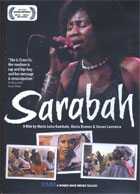
Sarabah 2011
Distributed by Women Make Movies, 462 Broadway, New York, NY 10013; 212-925-0606
Produced by Link TV and Yerosha Productions, Inc.
Directed by Maria Luisa Gambale and Gloria Bremer
DVD , color, 60 min., French, German, Diola and Wolof with English subtitles
Sr. High-General Adult
Activism, African Studies, Human Rights, Music, Sociology, Women’s Health, Women’s Studies
Date Entered: 07/13/2012
Reviewed by Linda Kelly Alkana, Department of History, California State University Long BeachSarabah is a well-made film about a remarkable woman. This documentary follows the growth of political consciousness of Senegalese song writer and hip hop singer, Sister Fa, from her early days challenging gender barriers by becoming a woman rapper , to her recent activities educating African village women and girls about female genital mutilation (FGM), sometimes called “excision” or “cutting,” or, more inaccurately, “circumcision.”
Focusing on Sister Fa’s activities primarily in Senegal and Germany, the film traces her early rise as a rap artist in Senegal, where she wins a “best new hip hop award” for her first album, to her life in Germany with her Austrian husband and daughter, where she works on her style, voice and music, eventually assembling an African inspired band, combining hip hop, Afro beat and funk.
About a third of the way into the film, we learn that Sister Fa had been a victim of “cutting” as a child. Although now illegal in Senegal, it is still practiced in rural areas. With the support of her husband and band, Sister Fa returns to Senegal from Germany. In collaboration with Tostan, an NGO dedicated to grass roots activism and education, the musicians travel to the rural village where Sister Fa was raised. They play their music and talk to school children and prominent village figures about the need to stop the practice that hurts so many young girls.
As Sister Fa speaks about the subject, not only do the boys and girls in their lush tropical African school room learn about FGM, the tribal traditions behind it, and the medical and social consequences of this practice which is carried out in the woods without antiseptics or anesthesia, but so does Sarabah’s audience.
This film does a remarkable job of promoting education about “a painful tradition” without falling into clichés or stereotypes. Sister Fa’s reunion with her father, who doesn’t talk about such “women’s things,” and her aunt and other villagers who had Sister Fa excised show that change can happen. The village children sing “no to excision” and Sister Fa argues that “we can maintain our practices, but stop the cutting.”
Beyond this larger story, the film also demonstrates the power of music as seen in Sister Fa’s music videos, footage of a huge fund raising event in Berlin, and, especially, scenes of her shared music and dance sessions with the people of her village. Finally, it captures Sister Fa as a modern woman, suspended between two continents, wanting to make music and help the world, all the while juggling the demands of life, family and where to live.
Awards
- Golden Butterfly, Best Film, Movies that Matter Film Festival
- Winner, Cine Golden Eagle